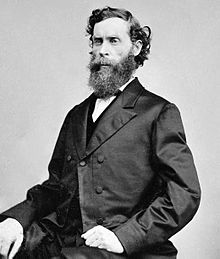John P. C. Shanks
John Peter Cleaver Shanks | |
|---|---|
 John P. C. Shanks | |
| Born | June 17, 1826 Martinsburg,Virginia(nowWest Virginia) |
| Died | January 23, 1901(aged 74) Portland,Indiana |
| Place of burial | Green Park Cemetery, Portland, Indiana |
| Allegiance | United States of America Union |
| Service/ | Union Army |
| Rank | |
| Commands held | 7th Indiana Cavalry Regiment |
| Battles/wars | American Civil War |
John Peter Cleaver Shanks(June 17, 1826 – January 23, 1901) was aU.S. RepresentativefromIndianafrom 1867 to 1875 and an officer in theUnion Armyduring theAmerican Civil War.
Biography
[edit]Born inMartinsburg,Virginia(nowWest Virginia), Shanks pursued an academic course. He studied law and wasadmitted to the barin 1848 and commenced practice inPortland, Indiana,in 1849. He served as prosecuting attorney of Jay County in 1850 and 1851 and served as member of the State house of representatives in 1855.
Shanks was elected as aRepublicanto theThirty-seventhCongress (March 4, 1861 – March 3, 1863). He was an unsuccessful candidate for reelection in 1862 to theThirty-eighthCongress.
During theCivil Warhe served in theUnion Armyas acolonelandaide-de-camptoMajor GeneralJohn C. Fremontfrom September 20, 1861 to June 1862. He was appointed a colonel in theregular armyand aide-de-camp from March 31, 1862 to October 9, 1863. He commanded the7th Indiana Cavalry Regimentas colonel from October 9, 1863 to December 8, 1864.[1]On December 12, 1864,President of the United StatesAbraham Lincolnnominated Shanks for appointment to the grade ofbrevetbrigadier generalof volunteers, to rank from December 8, 1864, and theUnited States Senateconfirmed the appointment on February 14, 1865.[2]He then commanded Brigade 1 of the Cavalry Division of the Department of Mississippi from December 8, 1864 to September 19, 1865, when he was mustered out of the volunteers.[1]
On December 3, 1867, PresidentAndrew Johnsonnominated Shanks for appointment to the grade of brevet major general of volunteers, to rank from March 13, 1865, and the United States Senate confirmed the appointment on February 14, 1868.[3]
Shanks was elected to theFortiethand to the three succeeding Congresses (March 4, 1867 – March 3, 1875) and served as chairman of the Committee on Militia (Forty-firstCongress) and the Committee on Indian Affairs (Forty-secondCongress).
Shanks was an unsuccessful candidate for renomination in 1874. He resumed the practice of his profession. He was again a member of the State house of representatives in 1879.
Shanks died inPortland, Indiana,January 23, 1901 and was interred in Green Park Cemetery.
See also
[edit]Notes
[edit]- ^abEicher, John H., andDavid J. Eicher,Civil War High Commands.Stanford: Stanford University Press, 2001.ISBN978-0-8047-3641-1.p. 757.
- ^Eicher, 2001, p. 757.
- ^Eicher, 2001, p. 714.
References
[edit]- Eicher, John H., andDavid J. Eicher,Civil War High Commands.Stanford: Stanford University Press, 2001.ISBN978-0-8047-3641-1.
- United States Congress."John P. C. Shanks (id: S000284)".Biographical Directory of the United States Congress.Retrieved on 2008-11-05
External links
[edit]- "John P. C. Shanks".Find a Grave.Retrieved2008-11-05.
![]() This article incorporatespublic domain materialfrom theBiographical Directory of the United States Congress
This article incorporatespublic domain materialfrom theBiographical Directory of the United States Congress
- 1826 births
- 1901 deaths
- Indiana lawyers
- American prosecutors
- Union Army colonels
- People of Indiana in the American Civil War
- People from Porter County, Indiana
- Politicians from Martinsburg, West Virginia
- Military personnel from Martinsburg, West Virginia
- People from Portland, Indiana
- 19th-century American legislators
- Republican Party members of the United States House of Representatives from Indiana


